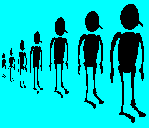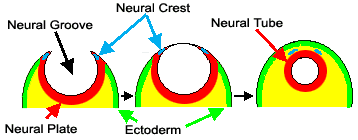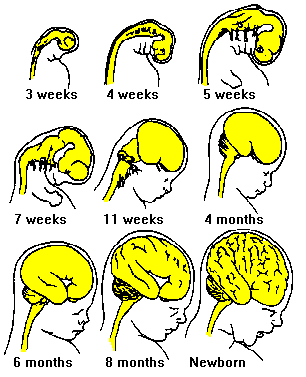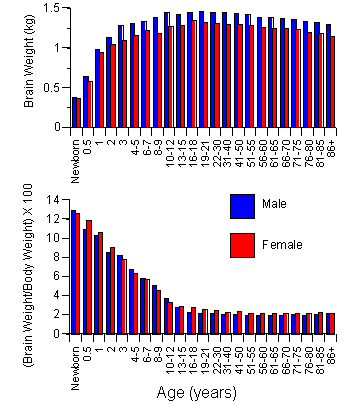Neuroscience For Kids
Brain Development
 The brain grows at an
amazing rate during development. At times during brain development,
250,000 neurons are added every minute! The brain
continues to grow for a few years after a person is born. The brain reaches
about 80% of its adult size when a person is about 2 years old.
The brain grows at an
amazing rate during development. At times during brain development,
250,000 neurons are added every minute! The brain
continues to grow for a few years after a person is born. The brain reaches
about 80% of its adult size when a person is about 2 years old.
You may wonder, "How does the brain continue to grow, if the brain has most of the neurons it will get when you are born?". The answer is in glial cells. Glia continues to divide and multiply. Glia carries out many important functions for normal brain function including insulating nerve cells with myelin. The neurons in the brain also make many new connections after birth.
The Brain During Development
The nervous system develops from embryonic tissue called the ectoderm. The first sign of the developing nervous system is the neural plate that can be seen at about the 16th day of development. Over the next few days, a "trench" is formed in the neural plate - this creates a neural groove. By the 21st day of development, a neural tube is formed when the edges of the neural groove meet. The rostral (front) part of the neural tubes goes on to develop into the brain and the rest of the neural tube develops into the spinal cord. Neural crest cells become the peripheral nervous system.

At the front end of the neural tube, three major brain areas are formed: the prosencephalon (forebrain), mesencepalon (midbrain) and rhombencephalon (hindbrain). By the 7th week of development, these three areas divide again. This process is called encephalization.

Average brain weights (BW)
AGE BW - Male (grams) BW - Female (grams) -------- ----------------- ----------------- Newborn 380 360 1 year 970 940 2 years 1,120 1,040 3 years 1,270 1,090 10-12 years 1,440 1,260 19-21 years 1,450 1,310 56-60 years 1,370 1,250 81-85 years 1,310 1,170
(Data from Dekaban, A.S. and Sadowsky, D., Changes in brain weights during the span of human life: relation of brain weights to body heights and body weights, Ann. Neurology, 4:345-356, 1978)
Brain Weight
 The top graph on the left shows the brain weights of
males and females at different ages. The bottom graph shows the brain
weight to total body weight ratio (expressed as a percentage). The adult
brain makes up about 2% of the total body weight.
The top graph on the left shows the brain weights of
males and females at different ages. The bottom graph shows the brain
weight to total body weight ratio (expressed as a percentage). The adult
brain makes up about 2% of the total body weight.
(Data from Dekaban, A.S. and Sadowsky, D., Changes
in brain weights during the span of human life: relation of brain
weights to body heights and body weights, Ann. Neurology,
4:345-356, 1978)
DID YOU KNOW? Touch is the first sense to develop. The developing fetus responds to touch of the lips and cheeks by 8 weeks and to other parts of its body at 14 week. The sense of taste may develop by 12 weeks and that of sound at 22-24 weeks. (Reference: Hepper, P., "Unraveling our beginnings", The Psychologist, 18:474-477, 2005.)
More about Brain Development

- Secret Life of the Brain - a PBS special exploring the brain from birth to old age
- Development and Neurobiology Column
- The TEEN Brain - articles from US News and World Report (August 9, 1999).
- Inside the Teenage Brain - PBS
- Zero to Three
- The brain during old age
Copyright © 1996-2015, Eric H. Chudler, University of Washington
